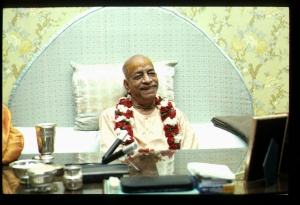SB 6.6.1: Difference between revisions
m (1 revision(s)) |
(Vanibot #0054 edit - transform synonyms into clickable links, which search similar occurrences) |
||
| (One intermediate revision by one other user not shown) | |||
| Line 1: | Line 1: | ||
{{info | {{info | ||
|speaker= | |speaker=Śukadeva Gosvāmī | ||
|listener=King | |listener=King Parīkṣit | ||
}} | }} | ||
[[Category:Srimad-Bhagavatam - Canto 06 Chapter 06|s01 ]] | |||
[[Category:Bhagavatam Verses Spoken by Sukadeva Gosvami - Vanisource|060601]] | |||
<div style="float:left">'''[[Srimad-Bhagavatam]] - [[SB 6|Sixth Canto]] - [[SB 6.6: The Progeny of the Daughters of Daksa|Chapter 6: The Progeny of the Daughters of Dakṣa]]'''</div> | |||
<div style="float:right">[[File:Go-previous.png|link=SB 6.6 Summary]] '''[[SB 6.6 Summary]] - [[SB 6.6.2]]''' [[File:Go-next.png|link=SB 6.6.2]]</div> | |||
{{RandomImage}} | |||
==== TEXT 1 ==== | ==== TEXT 1 ==== | ||
<div | <div class="verse"> | ||
śrī-śuka uvāca | :śrī-śuka uvāca | ||
tataḥ prācetaso 'siknyām | :tataḥ prācetaso 'siknyām | ||
anunītaḥ svayambhuvā | :anunītaḥ svayambhuvā | ||
ṣaṣṭiṁ sañjanayām āsa | :ṣaṣṭiṁ sañjanayām āsa | ||
duhitṟḥ pitṛ-vatsalāḥ | :duhitṟḥ pitṛ-vatsalāḥ | ||
</div> | </div> | ||
| Line 17: | Line 23: | ||
==== SYNONYMS ==== | ==== SYNONYMS ==== | ||
<div | <div class="synonyms"> | ||
śrī-śukaḥ | ''[//vanipedia.org/wiki/Special:VaniSearch?s=śrī&tab=syno_o&ds=1 śrī]-[//vanipedia.org/wiki/Special:VaniSearch?s=śukaḥ&tab=syno_o&ds=1 śukaḥ] [//vanipedia.org/wiki/Special:VaniSearch?s=uvāca&tab=syno_o&ds=1 uvāca]'' — Śrī Śukadeva Gosvāmī said; ''[//vanipedia.org/wiki/Special:VaniSearch?s=tataḥ&tab=syno_o&ds=1 tataḥ]'' — after that incident; ''[//vanipedia.org/wiki/Special:VaniSearch?s=prācetasaḥ&tab=syno_o&ds=1 prācetasaḥ]'' — Dakṣa; ''[//vanipedia.org/wiki/Special:VaniSearch?s=asiknyām&tab=syno_o&ds=1 asiknyām]'' — in his wife named Asiknī; ''[//vanipedia.org/wiki/Special:VaniSearch?s=anunītaḥ&tab=syno_o&ds=1 anunītaḥ]'' — pacified; ''[//vanipedia.org/wiki/Special:VaniSearch?s=svayambhuvā&tab=syno_o&ds=1 svayambhuvā]'' — by Lord Brahmā; ''[//vanipedia.org/wiki/Special:VaniSearch?s=ṣaṣṭim&tab=syno_o&ds=1 ṣaṣṭim]'' — sixty; ''[//vanipedia.org/wiki/Special:VaniSearch?s=sañjanayām&tab=syno_o&ds=1 sañjanayām] [//vanipedia.org/wiki/Special:VaniSearch?s=āsa&tab=syno_o&ds=1 āsa]'' — begot; ''[//vanipedia.org/wiki/Special:VaniSearch?s=duhitṟḥ&tab=syno_o&ds=1 duhitṟḥ]'' — daughters; ''[//vanipedia.org/wiki/Special:VaniSearch?s=pitṛ&tab=syno_o&ds=1 pitṛ]-[//vanipedia.org/wiki/Special:VaniSearch?s=vatsalāḥ&tab=syno_o&ds=1 vatsalāḥ]'' — all very affectionate to their father. | ||
</div> | </div> | ||
| Line 24: | Line 30: | ||
==== TRANSLATION ==== | ==== TRANSLATION ==== | ||
<div | <div class="translation"> | ||
Śrī Śukadeva Gosvāmī said: My dear King, thereafter, at the request of Lord Brahmā, Prajāpati Dakṣa, who is known as Prācetasa, begot sixty daughters in the womb of his wife Asiknī. All the daughters were very affectionate toward their father. | Śrī Śukadeva Gosvāmī said: My dear King, thereafter, at the request of Lord Brahmā, Prajāpati Dakṣa, who is known as Prācetasa, begot sixty daughters in the womb of his wife Asiknī. All the daughters were very affectionate toward their father. | ||
</div> | </div> | ||
| Line 31: | Line 37: | ||
==== PURPORT ==== | ==== PURPORT ==== | ||
<div | <div class="purport"> | ||
After the incidents concerning the loss of his many sons, Dakṣa repented his misunderstanding with Nārada Muni. Lord Brahmā then saw Dakṣa and instructed him to beget children again. This time Dakṣa was very cautious to beget female children instead of male children so that Nārada Muni would not disturb them by urging them to accept the renounced order. Females are not meant for the renounced order of life; they should be faithful to their good husbands, for if a husband is competent for liberation, his wife will also achieve liberation with him. As stated in the śāstra, the results of a husband's pious activities are shared by his wife. Therefore a woman's duty is to be very chaste and faithful to her husband. Then without separate endeavor she will share in all the profit the husband earns. | After the incidents concerning the loss of his many sons, Dakṣa repented his misunderstanding with Nārada Muni. Lord Brahmā then saw Dakṣa and instructed him to beget children again. This time Dakṣa was very cautious to beget female children instead of male children so that Nārada Muni would not disturb them by urging them to accept the renounced order. Females are not meant for the renounced order of life; they should be faithful to their good husbands, for if a husband is competent for liberation, his wife will also achieve liberation with him. As stated in the ''śāstra'', the results of a husband's pious activities are shared by his wife. Therefore a woman's duty is to be very chaste and faithful to her husband. Then without separate endeavor she will share in all the profit the husband earns. | ||
</div> | </div> | ||
__NOTOC__ | |||
<div style="float:right; clear:both;">[[File:Go-previous.png|link=SB 6.6 Summary]] '''[[SB 6.6 Summary]] - [[SB 6.6.2]]''' [[File:Go-next.png|link=SB 6.6.2]]</div> | |||
__NOTOC__ | |||
__NOEDITSECTION__ | |||
Latest revision as of 22:43, 18 February 2024

A.C. Bhaktivedanta Swami Prabhupada
TEXT 1
- śrī-śuka uvāca
- tataḥ prācetaso 'siknyām
- anunītaḥ svayambhuvā
- ṣaṣṭiṁ sañjanayām āsa
- duhitṟḥ pitṛ-vatsalāḥ
SYNONYMS
śrī-śukaḥ uvāca — Śrī Śukadeva Gosvāmī said; tataḥ — after that incident; prācetasaḥ — Dakṣa; asiknyām — in his wife named Asiknī; anunītaḥ — pacified; svayambhuvā — by Lord Brahmā; ṣaṣṭim — sixty; sañjanayām āsa — begot; duhitṟḥ — daughters; pitṛ-vatsalāḥ — all very affectionate to their father.
TRANSLATION
Śrī Śukadeva Gosvāmī said: My dear King, thereafter, at the request of Lord Brahmā, Prajāpati Dakṣa, who is known as Prācetasa, begot sixty daughters in the womb of his wife Asiknī. All the daughters were very affectionate toward their father.
PURPORT
After the incidents concerning the loss of his many sons, Dakṣa repented his misunderstanding with Nārada Muni. Lord Brahmā then saw Dakṣa and instructed him to beget children again. This time Dakṣa was very cautious to beget female children instead of male children so that Nārada Muni would not disturb them by urging them to accept the renounced order. Females are not meant for the renounced order of life; they should be faithful to their good husbands, for if a husband is competent for liberation, his wife will also achieve liberation with him. As stated in the śāstra, the results of a husband's pious activities are shared by his wife. Therefore a woman's duty is to be very chaste and faithful to her husband. Then without separate endeavor she will share in all the profit the husband earns.